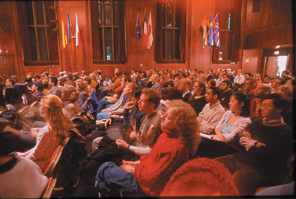 In
a time of uncertainty, U of C scholars search for perspective
In
a time of uncertainty, U of C scholars search for perspective
Three
weeks after the September 11 attacks on the U.S., a group of
students assembled in the Ida Noyes library to try and make
sense of it all. They gathered to hear about the challenges
of recovering economically from events they were still engaging
emotionally. Grace Tsiang, AM'83, PhD'91, senior lecturer in
economics, spoke of the healing of the American economy, but
she was really talking about the healing of America.

As
the uncertainties of recent months left many shocked, confused,
and looking for answers, University scholars-in true Chicago
style-tried to provide some. Conferences, lectures, and teach-ins
were quickly organized and lasted throughout the anthrax scare
and the war in Afghanistan.
Tsiang's
speech was followed on October 4 by a heavily attended conference
hosted by International House, "9/11: Its Causes and Consequences,"
with panels such as "Beyond the Clash of Civilizations,"
"Backlash in America," and "Political Uses of
Religion." University provost Geoffrey R. Stone, JD'71,
noted in his opening remarks that the conference fell on the
anniversary of I-House's founding in 1932, highlighting the
importance of being part of an international community. The
conference became an ongoing series of panels through the fall.
Close
to 400 people attended a GSB-sponsored event on October 17 at
the Gleacher Center. Edward Snyder, AM'78, PhD'84, dean of the
business school, moderated a panel of GSB professors who tried
to diagnose the U.S. economy's future. "Uncertainty puts
people in precautionary mode," said Kevin Murphy, PhD'86,
the George Pratt Schultz professor of economics and industrial
relations, "which makes for a natural digression in consumption
and spending." The panelists generally agreed, however,
that short-term effects would quickly be overcome by long-term
strength. "Our prediction," said Gary Becker, AM'53,
PhD'55, professor in economics and sociology, "is that
the economy will be back to where it was before, barring any
major event that can't be predicted." A week later another
Gleacher Center crowd turned out to hear scholars from Chicago
and Northwestern to discuss terrorism and politics in an event
hosted by the alumni association (click here
for the video).
Meanwhile
the 22nd annual Humanities Open House went on as scheduled in
late October, with an additional roundtable to address how humanistic
inquiry can help people reflect on recent events. More tailored
commentary was seen throughout October and November in lectures
by visiting speaker Tahmena Faryal, an Afghan women's-rights
activist; assistant professor of divinity Saba Mahmood, who
spoke on feminism and the Taliban; and Richard Salsman, an economist
invited by the student Objectivist Club, on the appeasement
of terrorism.
In
November Sigma Phi Epsilon, the fraternity that sponsored Grace
Tsiang's lecture, held another program, at which University
president Don M. Randel gave the talk "Higher Education
in the Wake of September 11." Randel reassured students
of the importance of continuing their education in the midst
of current world-changing events. "Higher education is
the single best system that mankind has yet devised with which
to attack suffering and ignorance," the president said,
"and you will be the people who carry on that great attack.
We are counting on you."
- C.S.

![]()
 In
a time of uncertainty, U of C scholars search for perspective
In
a time of uncertainty, U of C scholars search for perspective